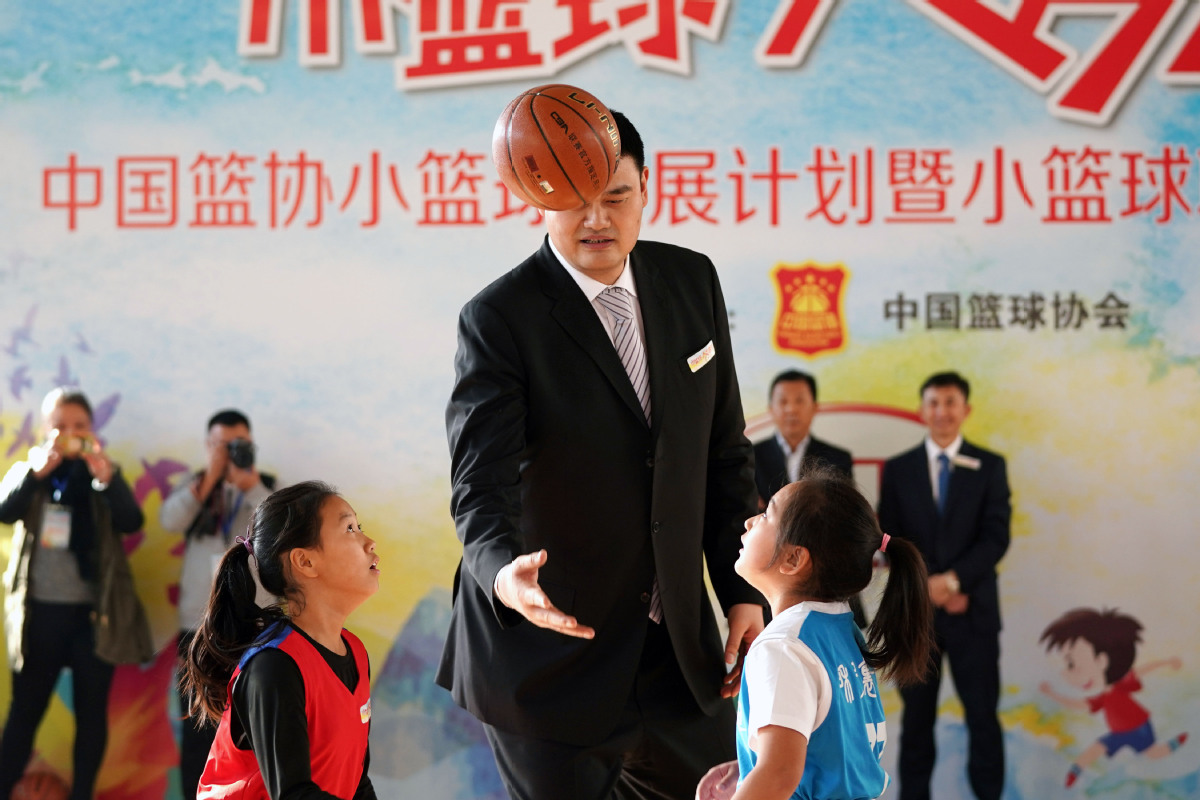Yao seeks to strengthen sports in primary grades
 0 Comment(s)
0 Comment(s) Print
Print E-mail China Daily, March 14, 2019
E-mail China Daily, March 14, 2019
Basketball legend Yao Ming has always voiced his support for physical education during the two sessions.

This year is no exception. Utilizing his position as a member of the Chinese People's Political Consultative Conference's National Committee, Yao called for more cross-departmental cooperation and better coaching to further expand a school basketball program launched last year.
The program is meant not just to deepen the sport's talent pool but, more importantly, to teach students life lessons that classroom study cannot.
"Sports participation, as part of all-around education, should be given a more prominent role on campus, whereas now academic excellence seems to be the main priority in our country," Yao told China Daily on Sunday in Beijing during the annual session of the country's top political advisory body.
"Building organized and accessible sports competitions with tailor-made programs and adequate facilities is the key to involving as many students as possible," said Yao, who is chairman of the Chinese Basketball Association.
At last year's two sessions, he proposed implementation of a "mini basketball" program for younger students. It saw 10,000 participants registered with the CBA sign up for some 15,000 teams that competed regularly in 192 cities across the country over the past year.
The program, customized for primary school students, features smaller basketballs, lower rims and more accessible courts on campus to make the already popular sport even more appealing.
Yao, at 2.26 meters tall, has been a towering figure at two sessions meetings since 2013. But this year, instead of making new proposals, he chose to focus on gathering more support from governmental departments to expand the program.
"It has to be a collaborative effort between the sports and education departments," said Yao, an eight-time NBA All-Star with the Houston Rockets.
"To make it campus-based means we don't count on it to cultivate future pro players. … We believe participation in team sports helps children grow stronger as individuals physically and mentally."
Yao's effort found favor with the 21-member sports panel of the CPPCC, where retired champions, sports officials, scholars and entrepreneurs agreed to make a joint proposal this year to call for greater investment and policy support from the education, finance and rural-urban development authorities to raise the level of student participation in sports.
In response, the Ministry of Education has pledged to enhance the role of physical education on campus by making school PE classes more fun, providing better training of PE teachers and investing more in facility upgrades as a primary task in 2019.
"We've taken serious measures to address the decline in student fitness levels, and we have already seen results, but it seems the effort is still not enough," Zhong Denghua, a vice-minister of education, said during a group discussion with the sports panel on Monday.
According to the latest national students' fitness survey, released in 2017, 75 percent of primary and secondary schools had built campus sports venues that met national standards, up from 62.4 percent in 2012. The survey was conducted by the ministry and the General Administration of Sport of China.
In 2015, the same survey showed that the overall fitness level of primary and secondary students-including stamina, strength and aerobic capacity-h(huán)ad begun to improve following a perennial decline.
"Our measures have worked but it doesn't mean we can stop pushing. The fact that three-quarters of schools have adequate sports fields and facilities shows that we still have room to improve," Zhong said.
Chi Jian, a CPPCC member and former president of Beijing Sport University, suggested that the education ministry and the GASC, the country's top sports governing body, should work together to build a training and evaluation platform online to encourage retired athletes and coaches to get involved in helping schools.
"As important as upgrading facilities is raising the status of PE teachers in schools to the level of their counterparts in charge of academic classes," Chi said.
PE tests are included in China's high school entrance exams, with required scores varying based on local policies. However, PE performance is not included in the scoring system for the college entrance examination, or gaokao.





